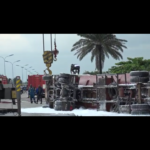The Federal Government has proposed a one-year time limit for the full return of its artefacts from Germany, which has agreed to repatriate hundreds of antiquities that were looted from the Bini Kingdom in 1897.
The Minister of Information and Culture, Alhaji Lai Mohammed, made the proposal during a round-table with German Museum Directors and government officials in Berlin, Germany, on Thursday.
The Minister, who is leading a Nigerian government delegation for high-level talks with German government officials on the repatriation of the artefacts, said the agreement for the repatriation of the Benin Bronzes from Germany must be signed by December 2021.
”For us, the most important issue in the road map is the signing of the agreement and the date of return. We won’t move forward if we don’t have a clear date on signing and return,” he told participants at the round-table. ”Full return should be completed in a year’s time, not beyond August 2022.”
Alhaji Mohammed said Nigerians are eagerly awaiting the return of the 1,130 Benin Bronzes, which are being held by various museums in Germany.
The German Federal Government is coordinating the return of the Benin Bronzes, which are mostly held by state and private museums. Of the 6,600 museums in Germany, less than five per cent are owned by the Federal Government.
Speaking at the roundtable, the Secretary of State in the German President’s office, Mr Stephen Steinlein, said the President is happy with the progress made so far on the planned repatriation of the artefacts.
He described the planned return of the artefacts as ”a lighthouse project” and assured that the President would continue to follow the process keenly.
Work is set to begin on the building of a museum, tagged Edo Museum of West African Art (EMOWAA), in Benin city that will hold the artefacts when they are repatriated.
The Governor of Edo State, Mr Godwin Obaseki, who is also part of the Nigerian delegation, told the roundtable that the museum is part of a transformation project being planned to make Benin city a cultural hub.
The architect handling the museum project, Sir David Adjaye, made a presentation to the roundtable, during which he said the project would fuse the technology of ancient Benin Kingdom to that of the 21st century to get an organic pavilion that will boast of an auditorium, storage as well as exhibition space, among other facilities.
Earlier in the day, the Nigerian delegation met with representatives of Ethnologisches Museum Berlin-Dahlem, where a select number of Benin bronzes, some of them dating back to the 16th century, were on display.
YOU SHOULD NOT MISS THESE HEADLINES FROM NIGERIAN TRIBUNE
We Have Not Had Water Supply In Months ― Abeokuta Residents
In spite of the huge investment in the water sector by the government and international organisations, water scarcity has grown to become a perennial nightmare for residents of Abeokuta, the Ogun State capital. This report x-rays the lives and experiences of residents in getting clean, potable and affordable water amidst the surge of COVID-19 cases in the state…Nigeria proposes 1-year Nigeria proposes 1-year
Selfies, video calls and Chinese documentaries: The things you’ll meet onboard Lagos-Ibadan train
The Lagos-Ibadan railway was inaugurated recently for a full paid operation by the Nigerian Railway Corporation after about a year of free test-run. Our reporter joined the train to and fro Lagos from Ibadan and tells his experience in this report…Nigeria proposes 1-year Nigeria proposes 1-year






